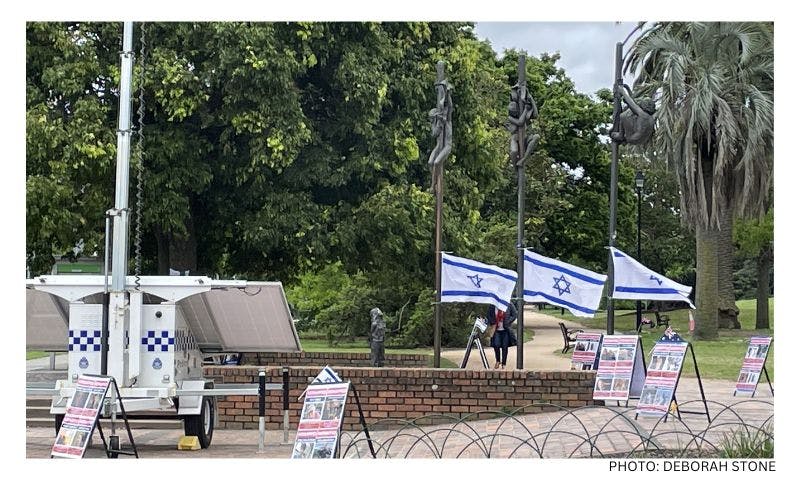Published: 17 December 2021
Last updated: 4 March 2024
BEN LYNFIELD: Authorities say the centre near Hebron was built illegally on an archaeological site; youth group and NGOs claim the threat is designed to deter their activism
A WARNING BY Israel's military administration that the headquarters of a Palestinian youth group that opposes settler violence must be dismantled has prompted dismay among local Palestinians and concern from Israeli human rights activists.
The order says the building’s construction in Tuwani village, in the south Hebron hills, has damaged archaeological remains. It does not set a deadline for demolition but instructs that the building be removed or else a complaint will be filed with police.
Palestinian locals and Israeli activists claim the army’s motive is not really to enforce planning laws but rather to cripple the youth group, Youth of Sumud, which has 30 members and among its activities, documents alleged settler and army abuses. Youth of Sumud is non-violent, according to its director, Sami Hureini, a tag backed up by Israeli activists familiar with the group.
The story of Tuwani is not just about a new building. It also sheds light on the practices of the occupation machinery made up of the ruling Israeli right, settlers and the Israel Defence Forces (IDF).
The two-storey structure, which has an office, meeting hall and rooms for Israeli and international activists to stay over, is very near completion and has been in use for two months.
It will be a place for inculcating non-violent resistance, according to Ali Abu Awwad, an internationally known non-violent activist who has engaged in dialogue with bereaved Israeli families and moderate settlers in the Etzion Bloc area of the West Bank.
"We want to have a huge transformation of the meaning of non-violence, from being aggressive to being responsible," he told The Jewish Independent.

The youth centre would mark a major upgrading of the capabilities of Tuwani residents to organise on their own behalf in the face of an occupation they perceive as intent on driving Palestinians off their land. Its construction was funded by Palestinian real estate tycoon Bashar Masri, best known as the founder of the modern Western-style town of Rawabi near Ramallah.
But Israeli military administrators, in a written statement to The Jewish Independent, appeared to indicate the building, which took more than a year to build, could be levelled: "Lately warning orders were issued to stop the destruction of antiquities after construction work was carried out illegally on an archaeological site, harming and destroying antiquities.
"We point out that enforcement will be carried out in accordance with authorities and procedures subject to operational considerations," the statement said.
The explanation is questioned by experts and activists familiar with this type of dispute. Alon Cohen-Lifshitz, responsible for the West Bank at the Israeli planning rights NGO Bimkom, termed the military administration's action "out of the ordinary" and did not rule out political motives.
"In the past there were cases of demolition orders against people who filed court appeals or resisted [the occupation]. It's something that happens," he says.
Sami Hureini, 24, responds that "it is not harming any archaeological site. It is punishment for all the work Youth of Sumud is doing for Tuwani."
'Why don't the Arabs respect archaeology? I simply cannot fathom it' - veteran settler leader Daniella Weiss
Veteran settler leader Daniella Weiss, who lives in the northern West Bank, says the army is right to crack down on any Arab construction at an archaeological site. "Why don't the Arabs respect archaeology? I simply cannot fathom it," she says.
Unlike many villages, Tuwani has a master plan approved by authorities, with some sections designated as archaeological areas that are off-limits to building, Cohen Lifshitz explains.
In practice, authorities until now have refrained from acting against any construction as long as it is inside the borders of a given master plan, he says. "It's surprising; I don't think they will demolish it, but we have to keep our eyes on it."

His sense of vigilance is pressing. Israel is on a demolition binge regarding Palestinian building in the area under its full control in the West Bank, with official statistics showing 797 demolition orders issued in 2020, the highest number in five years. Hardest hit are the south Hebron hills, Cohen-Lifshitz says.
The building in Tuwani is intended as a base for Tuwani volunteers who have taken it upon themselves to accompany children and farmers who face potential settler attack and who photograph alleged settler and army abuses.
"We are human rights defenders," says Hureini. "We organise demonstrations, protect the land and document what is going on.
"This is the reason we got the order, because of our youth activism. They want to deter people from activism, to be scared they will lose their house."
Meanwhile, Itai Feitelson, one of a group of Israelis who volunteer to help Tuwani and other villages, speculates the military administrators may have a twofold purpose: to discourage building locally and to harm Youth of Sumud.
He told The Jewish Independent that the military’s stance could fit in with a pattern of harassment against residents of the Tuwani area, including settler attacks where soldiers arriving on the scene fire tear gas and stun grenades at the Palestinians and do not detain settlers.
Feitelson also alleges that police arrest Palestinians at the behest of settlers even if there is no proof of wrongdoing. "Palestinians can spend days in jail for nothing," he says.
By contrast, the police do not act on Palestinian complaints against settlers, Feitelson stated. In a statement to The Jewish Independent, the Israel police denied this allegation, saying the law is applied equally and that any complaint "that raises suspicion of criminal behaviour is investigated and handled thoroughly and professionally".
Tuwani is near the militant Avigail and Maon settlements and the settlement outpost of Havat Maon, also known for its militancy. All of these government-backed housing clusters violate the Fourth Geneva Convention, which prohibits an occupying power from moving its nationals into the occupied territory.
But Havat Maon is illegal even under Israeli law since its establishment has never been formally approved.
The threat of violence from settlers is so fierce that the army has standing orders to escort children from the village of Tuba on part of their walk to school in Tuwani.
The violence against the Palestinians is brazen. Last Wednesday settlers shoved Tuwani children to the ground while they were on their way to school even though troops were present, according to Hureini and Feitelson.
In response to a query by The Jewish Independent, the IDF spokesman's office said that one among a group of Palestinian children had run towards the flock of an Israeli shepherd "who in turn acted to keep the [children] away.
"The troops separated them and called the law enforcement for further treatment," the statement said.
In late September, several masked stone-throwers targeted a house in Tuwani, Feitelson said. This was on the day a larger group of settlers assaulted the nearby Palestinian hamlet of Mufaqara, wounding six, including a four-year-old child who was struck in the head by a stone.
The attack, the most serious in a spate of settler violence in the West Bank, also caused widespread property damage and left villagers in fear of a recurrence.
The IDF denies that it sides with settlers against Palestinians. "Any claim that the IDF supports and permits settler violence is false," the IDF spokesman's office wrote to The Jewish Independent, adding that the army will continue "to operate to maintain stability and security for the residents of the region".
Yochai Damri, head of the Mount Hebron Regional Council, which oversees settlements in the area, did not respond to requests to be interviewed for this article. Settler leader Daniella Weiss alleged that left wingers and the US state department are accusing the wrong side when they speak of settler violence.
"I think that Jews are very gentle," she told The Jewish Independent.
But in Tuwani, the threat of violence from local settlers is so fierce that the army has standing orders to escort children from the tiny village of Tuba daily on part of their walk to the area school in Tuwani.
Residents and Israeli activists say this mission is only partly fulfilled by the military and needs to be monitored by them.
Despite the escorts, links between the army and settlers are so close that the army often gets its information on which homes to demolish from government sponsored patrols run by settlers, according to a report by Haaretz on December 8.
Earlier this year, Sami Hureini was arrested from his home around midnight after two protests by Youth of Sumud against a shooting by the army that left local Palestinian Harun Abu Aran paralysed. The IDF did not respond to a query about the shooting in the neck of Abu Aran.
Hureini was released conditionally after a week in jail but is due to go on trial this Sunday for allegedly organising illegal demonstrations, assaulting a soldier and being in a closed military area in January. He claims the charges are "false".
But his future may be bleak. Israeli military courts in the West Bank have a nearly 100 percent conviction rate, according to the B'tselem human rights group.
Meanwhile, Hureini says he is pinning his hopes on Israeli and international activists "to give the world the real image of what's happening here.
"The unfairness of this situation is really terrifying, really annoying and really frustrating."
Photo: Youth of Sumud leader Sami Hureini, centre, with fellow members (Kurve)




